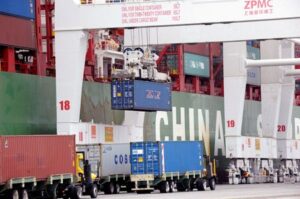By Tim Hepher and Nathan Gomes
(Reuters) -The head of aircraft leasing giant AerCap predicted that tightness in global jet markets would last through the rest of the decade, fuelled by supply chain issues and conservatism on production among engine makers.
Demand for air travel has rebounded since the pandemic, while planemakers are struggling to get back to production levels seen before the health crisis disrupted supply chains, helping to push up airfares.
“I believe it will take until the end of the decade before the airframers and the supply chain get together and work it out; that will be 2030, I suspect,” CEO Aengus Kelly told a company investor event on Wednesday.
He was speaking after AerCap gambled on continuing bottlenecks in MRO or repair shops by agreeing to buy 150 new spare LEAP engines from French-U.S. venture CFM, which powers all Boeing and some Airbus narrow-body jets.
The engines will be managed by Shannon Engine Support, a joint-venture between AerCap and France’s Safran, which co-owns CFM along with GE Aerospace.
Shares in AerCap rose 2.6%.
Shortages of spare engines, especially those made by CFM rival Pratt & Whitney, have forced airlines to ground jets while waiting for repair slots, which are already scarce due to faster than expected wear-and-tear in harsh climates.
Kelly, who has overseen AerCap’s gradual transformation from a rump containing the bad assets of defunct Irish leasing empire GPA to the world’s largest lessor through acquisitions, spelled out the stakes in successfully managing maintenance delays.
AerCap says more is spent on maintaining a plane in MRO or repair stations than it costs to buy it in the first place.
“The MRO shops are like dentists. They only get paid when they open something up, take something out and put something back in. The difference with these engines is it’s a million bucks to put something back in every single time,” Kelly said.
“And if you don’t know what you’re doing, you will find yourself spending millions more. You will find yourself going to MROs that you don’t have leverage with, where you’re at the back of the queue.”
SHARE BUYBACKS
Despite announcing an inaugural cash dividend, Kelly said the Dublin-based company’s primary method for returning cash to shareholders would remain share buybacks.
AerCap’s board approved a new $500 million share repurchase programme through Dec. 31.
Addressing concerns among some investors and suppliers that the jet shortages would eventually tilt back towards a surplus, Kelly said engine makers would steer planemakers away from any overproduction to safeguard their lucrative repair businesses.
Planemakers and engine firms are involved in a tug of war over the share of parts between new factories and repair shops.
Analysts say the interests of lessors and engine firms are aligned because both recoup their investments over 20 years or so, and dislike new planes crowding out older ones too quickly.
Asked if AerCap would keep growing through acquisitions, after some $62 billion of deals since 2005, Kelly said, “M&A is always something we’re looking at of course, but right now we believe that the cheapest assets we can buy are our own shares.”
Nor was AerCap in a hurry to join a recent rush of airlines to buy new jets to cope with resurgent demand.
AerCap will not overpay for new aircraft, Kelly said, adding: “I am the most reluctant aircraft buyer in the world”.
(Reporting by Tim Hepher in Paris and Nathan Gomes in Bengaluru; Editing by Shilpi Majumdar, Mark Potter and Deepa Babington)





